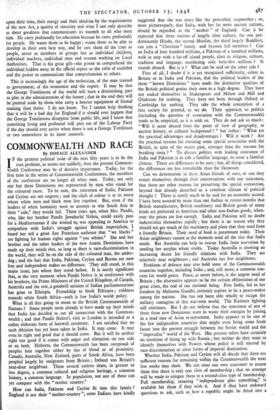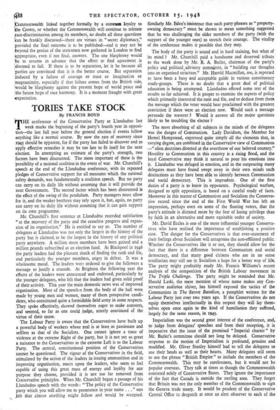COMMONWEALTH AND RACE
By HORACE ALEXANDER
IF the greatest political issue of the next fifty years is to be the race problem, as seems not unlikely, then the present Common- wealth Conference may be of decisive importance. Today, for the first time in the series of Commonwealth Conferences, the members of the conference are no longer all white men. Today, not only one but three Dominions are represented by men who stand for the coloured races. To be sure, the statesmen of India, Pakistan and Ceylon are not negroes ; and the clash of colour is at its worst where white men and black men live together. But, even if the leaders of white humanity were to attempt to win South Asia to their " side," they would faiL Three years ago, when Mrs. Pandit, who, like her brother Pandit Jawaharlal Nehru, could easily pass for a Mediterranean if she wished to, was appealing to America to sympathise with India's struggle against British imperialism, I heard her tell a great San Francisco audience that " we blacks " are fighting for human rights against " you whites." She and her brother and the other leaders of the new Asiatic Dominions have made up their minds that, so long as there is race-discrimination in the world, they will be on the side of the coloured man, the under- dog ; and the fact that India, Pakistan, Ceylon and Burma are now free and independent makes no difference. They still stand, in this major issue, just where they stood before. It is surely significant that, at the very moment when Pandit Nehru is in conference with his brothers, the Prime Ministers of the United Kingdom, of Canada, Australia and the rest, a goodwill mission of Indian parliamentarians has gone to Ethiopia. Friendship to black Ethiopia ; coldness towards white South Africa—such is free India's world policy.
What is all this going to mean to the British Commonwealth of Nations ? Some people seem already to have made up their minds that India has decided to cut all connection with the Common- wealth ; and that Pandit Nehru's visit to London is intended as a rather elaborate form of farewell ceremony. I am satisfied that no such decision has yet been taken in India. It may come. It may even be right and good that it should come. But it will be neither right nor good if it comes with anger and alienation on one side or on both. Hitherto, the Commonwealth has been composed of peoples knit together either by ties of blood or of proximity. Canada, Australia, New Zealand, parts of South Africa, have been peopled largely by emigrants from Britain ; Ireland was Britain's next-door neighbour. These several nations share, in greater or less degree, a common cultural and religious heritage, a common history, a common language. In population, not one of these can yet compare with the " mother country."
How can India, Pakistan and Ceylon fit into this family ? England is not their "mother-country"; some Indians have kindly suggested that she was more like the proverbial stepmother ; or, more picturesquely, that India, with her far more ancient culture, should be regarded as the "mother " of England. Can it be expected that three nations of largely alien culture, the one pre- dominantly Hindu, the second Muslim, the third largely Buddhist, can join a " Christian" family and become full members ? Can an India of four hundred millions, a Pakistan of a hundred millions, walk in step with a far-off island people, alien in religion, culture, tradition and language, numbering only forty-five millions ? It sounds absurd. But is it ? What can be said on the other side ?
First of all, I doubt if it is yet recognised sufficiently, either in Britain or in India and Pakistan, that the political leaders of the three " brown Dominions " have made the distinctive qualities of the British political genius their own to a high degree. They have not soaked themselves in Shakespeare and Milton and Mill and Gladstone for nothing. They have not been through Oxford or Cambridge for nothing. They take the whole conception of a free society for granted, as we do. Their approach to politics (including the question of association with the Commonwealth) tends to be empirical, as it is with us. They do not ask so much: " Will it seem absurd from the point of view of geography, or ancient history, or cultural background ? " but rather : " What are the practical advantages and disadvantages ? Will it work ? Are the practical reasons for retaining some special association with the British, in spite of the recent past, stronger than the reasons for breaking away ? " To discuss politics with leading statesmen of India and Pakistan is to talk a familiar language, to sense a familiar climate. There are differences to be sure ; but, all things considered, the differences are less remarkable than the likenesses.
Can we demonstrate to these Asian friends of ours, or can they assure themselves through their conversations with our statesmen, that there are other reasons for preserving the special connection, beyond that already described as a common climate of political thought ? There is surely much to be said for an economic accord.
I have been assured by more than one Indian in recent months that British manufactures, British machinery and British goods of many kinds are preferred to American and other non-Indian goods, when- ever the prices are low enough. India and Pakistan will no doubt industrialise themselves rapidly ; but there is no reason why they should not get much of the machinery and plant that they need from a friendly Britain. Their need of food is paramount today. Their Asian neighbours cannot at the moment send all the rice that India needs. But Australia can help• to rescue India from starvation by sending her surplus wheat stocks. Today Australia is showing an increasing desire for friendly relations with India. They are relatively near neighbours ; and Australia has few neighbours.
Problems of defence may also hold some of the Commonwealth countries together, including India ; and, still more, a common con- cern for world peace. Peace, as never before, is the urgent need of
Britain ; the alternative appears to be the certain obliteration of our great cities, the end of our national being. Free India, led to her
freedom by Mahatma Gandhi, certainly aspires to be a peace-maker among the nations. She has not been able wholly to escape the military contagion of this war-torn world. The Kashmir fighting still continues. But I do not believe that the statesmen of any of these three new Dominions want to waste their energies by joining in a mad race of Asian re-armament. India appears to be one of the few independent countries that might even bring some fresh factor into the present struggle between the Soviet world and the " imperialist " world of the West. Her present rulers have certainly no intention of lining up with Russia ; but neither do .they want to identify themselves with Powers whose policy is still marred by race-discrimination or other forms of imperial domination.
Whether India, Pakistan and Ceylon will all decide that there are sufficient reasons for remaining within the Commonwealth the next few weeks may show. We can trust our own statesmen to assure them that there is only one class of membership ; that no attempt will be made to relegate them to a second-class type of membership.
Full membership, meaning " independence plus something," is available for them if they wish it. And if they have awkward questions to ask, such as how a republic might be fitted into a !Commonwealth linked together formally by a common loyalty to the Crown, or whether the Commonwealth will continue to tolerate race-discrimination among its members, no doubt all these questions can be frankly discussed—there are virtues in " secret diplomacy," provided the final outcome is to be published—and it may not be beyond the genius of the statesmen now gathered in London to find appropriate, even if not final, answers. The one blasphemy would be to assume in advance that the effort to find agreement is doomed to fail. If there is to be separation, let it be because all parties are convinced that it is the better course. But separation induced by a failure of courage or trust or imagination or magnanimity, especially if that failure comes from the British side, .;would be blasphemy against the present hope of world peace and the future hope of race harmony. It is a moment fraught with great 'expectation.



































 Previous page
Previous page